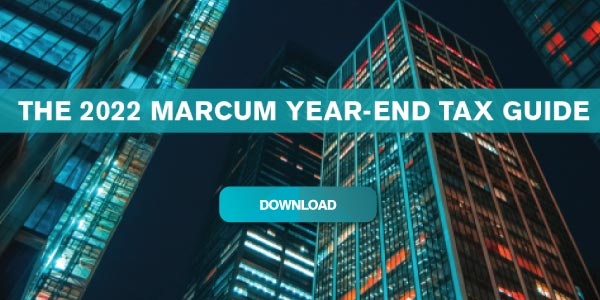Corporate Year-End Tax Planning: Emerging from the TCJA
As the business world returns to a new normal, corporations, like other taxpayers, are putting more emphasis than ever on planning. Planning may have taken a secondary position during the last two difficult business years. Corporations are very interested in planning and managing their business proactively rather than just reacting to outside forces. This move back to proactive planning parallels with the sunsetting of provisions of the Tax Cut and Jobs Act of 2017 (“TCJA”) and the passing of new legislation. 2023 tax planning will be an integral part of corporations’ overall business planning as we emerge out of the pandemic era and into a new business normal.
100% Bonus Depreciation – Section 168(k)
Acquiring qualified property and placing it into service before year-end can result in a full expense deduction or bonus depreciation deduction for 2022. However, there are many considerations when planning for year-end purchases, including changes in the amount of allowable bonus depreciation in 2023 and the possibility of increased tax rates.
The 2022 tax year is the last opportunity for businesses to take advantage of 100% bonus depreciation under the Tax Cuts and Jobs Act of 2017 (TCJA). Beginning in 2023, the bonus percentage will decrease to 80% and then drop 20% each year until phased-out completely (60% for 2024; 40% for 2025; 20% for 2026, and 0% for 2027 and later).
To be eligible for bonus depreciation, qualified property must be both purchased and placed into service prior to December 31, 2022.
For real property purchased in 2022, a cost segregation study would allow a taxpayer to maximize bonus depreciation for building components by categorizing them into separate asset classes with recovery periods of 20 years or less. Marcum can provide cost segregation studies that identify and assign costs to building elements that are “dedicated, decorative, or removable” and, therefore, eligible for cost recovery over shorter asset lives than that of real property.
Election to Expense Certain Depreciable Business Assets – Section 179
With the phase-out of 100% bonus depreciation in 2023, the first-year election to expense certain depreciable business assets under section 179 may be more attractive.
For 2022, the maximum amount of section 179 property that can be fully expensed is $1.08 million. That limit will begin to phase out once the amount of section 179 property placed into service in 2022 exceeds $2.7 million (complete phase-out will occur at $3.78 million of expense-eligible property placed into service).
Beginning in 2023, the aggregate cost of any section 179 property that a taxpayer elects to treat as an expense cannot exceed $1.16 million. The $1.16 million limitation is reduced (but not below zero) by the amount by which the cost of section 179 property placed into service during the 2023 taxable year exceeds $2.89 million (complete phase-out occurs at $4.05 million of expense-eligible property placed into service).
Business Interest Expense – Section 163(j)
The Internal Revenue Code (IRC) limits the deduction of business interest expense. The deduction limit for business interest doesn’t apply to businesses with three-year average gross receipts of $27 million or less for 2022 ($29 million for 2023).
For tax years beginning after December 31, 2021, business interest expense may be more limited and taxable income may be increased under Section 163(j). The deduction is limited to 30% of the taxpayer’s earnings before interest and taxes (EBIT) instead of earnings before interest, taxes, depreciation and amortization (EBITDA).
Since depreciation provides no advantage, a broader analysis under the Section 263(a) repair regulations may be advantageous as capitalized items may be eligible to be expensed. Marcum can assist with a review of the Section 263(a) regulations to reduce capitalized costs and maximize deductible expenses.
Research and Experimental – Section 174
Beginning in 2022, the TCJA requires capitalization of Research and Experimental (R&E) costs. These Section 174 expenses must be amortized over five years (15 years for foreign R&E), and the amortization must be continued regardless of whether the underlying property is disposed, retired, or abandoned during the amortization period. Software development costs are included in the required capitalization without the option to expense.
This provision was one of the revenue raisers that supported the tax reductions included in the TCJA. Taxpayers with a significant R&E spend may find themselves in a taxable income position due to capitalization and amortization.
This change may be significant for some taxpayers and have multiple ramifications, including impacting cash-flow planning and cash needed for taxes, and increasing taxable income for purposes of the interest limitation of Section 163(j). Potential analysis under Section 382 may be needed if net operating losses (NOLs) will be utilized.
Business Meals – Section 274
The provision allowing 100% deduction of certain business meals under the Consolidated Appropriations Act of 2020 (“CAA”) will expire in 2023. The CAA’s generous deduction rule provided taxpayers a temporary respite for food and beverage expenses provided by a restaurant, and incurred or paid from January 1, 2021, through December 31, 2022. For 2023, the original limitation of 50% deductibility on all food and beverage expenses will be restored.
Looking forward – 2023
For years beginning after December 31, 2022, under the Inflation Reduction Act (IRA), a 15% corporate minimum tax on companies with profits greater than $1 billion and a 1% excise tax on stock repurchases by publicly traded companies will be enforced.
Corporate Alternative Minimum Tax – Section 55(b)(2)
The last corporate AMT was repealed by the TCJA in 2017. The new corporate AMT is based on book income rather than taxable income. Specifically, it imposes a 15% tax on the excess of the corporation’s adjusted financial statement income over its corporate alternative minimum tax foreign tax credit for the year. The new corporate AMT applies only to certain large corporations with average annual financial statement income of more than $1 billion for the prior three consecutive tax years, or, for members of certain foreign-parented multinational groups, where the combined annual adjusted financial statement income from all members of the group is $1 billion for three consecutive years and the member has an annual adjusted financial statement income of more than $100 million. This provision does not apply to S-corporations, regulated investment companies, or real estate investment trusts.
Excise Tax on Stock Buybacks – Section 4501(a)
Additionally, the IRA introduces a 1% excise tax on corporate stock repurchases. The tax is imposed on a domestic corporation with stock traded on an established securities market. The tax is based on the fair market value of the stock repurchased, reduced by the fair market value of any new stock issued during the year. The provision does not apply where the total value of the stock repurchased during a tax year is $1 million or less. It also does not apply to stock repurchased under certain reorganizations, where the repurchased stock is contributed to an employee-sponsored retirement plan, employee stock ownership plan or similar plan.






























